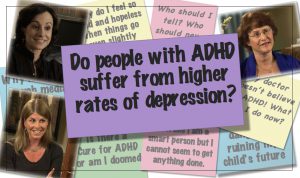ADHD and Depression
If you had a life of untreated ADHD you’d be depressed too. It’s not only depression, ADHD leads to higher rates of:
- Depression
- Failure
- Divorce
- Personal problems
- Risk taking
- Accidents
- Anxiety disorders
- and lower self-esteem.
Depression Anxiety and ADHD
Do people with ADHD suffer from higher rates of depression?
Dr. Annick Vincent – if you have ADHD in your kid that increases your risk of being depressed we know it increases the risk of school failure there aren’t kids who have ADHD who don’t struggle in school but most of the kids with ADHD we also have learning problems. Not maybe an LD that is learning disorder but at least learning problems.
Dr Jain – it increases the risk of other interpersonal problems poor conflict resolution for example
Dr. Annick Vincent – now you have been an adult who is more argumentative he would say
Kate Kelly – I was the one that you know I was jumping all around in utero and couldn’t wait to get out and you know got out of my crib at eight months and you know ran away at 18 months and laid down in the train tracks to see if I could stop the train. lots of accidents.
Dr. Annick Vincent – accidents you know severe enough that that kid would go to the emergency room then that kid will drive a car so guess what happens increases the risk of accidents.
Do people with ADHD have lower self-esteem?
For sure it increases your risk of having a low self-esteem you may have more anxiety than the general population.
Dr. Laura Muggli – if you’re sort of unruly or hyperactive and you get you know abused or beaten or you’re told that you’re stupid or lazy or you can’t do it or why don’t you just pay attention more you know when you really can’t pay attention.
Dr. Margaret Weiss – the parent may complain that the child is lazy.
Patrick McKenna – you were lazy you didn’t apply yourself.
Dr. Margaret Weiss – well ADHD is a difficulty with forced effort or the child may complain that he’s bored.
Patrick McKenna – you were always distracted by talking to other people he didn’t talk to other people so much maybe you can get your work done.
Dr. Margaret Weiss – the difficulty he’s describing is that the normal level of stimulation which we would be comfortable with isn’t sufficient to hold him or a third difficulty that might be described as a brother or a sister might say he’s buggy in other words he’s always at them he’s always talking he’s always fidgeting he’s always squirming.
Patrick McKenna – there was always a reason it was always my fault that I wasn’t succeeding so again
no matter how hard you work no matter what at the end of day was going to be my fault.
View related videos
View related blog posts



Leave A Comment
You must be logged in to post a comment.